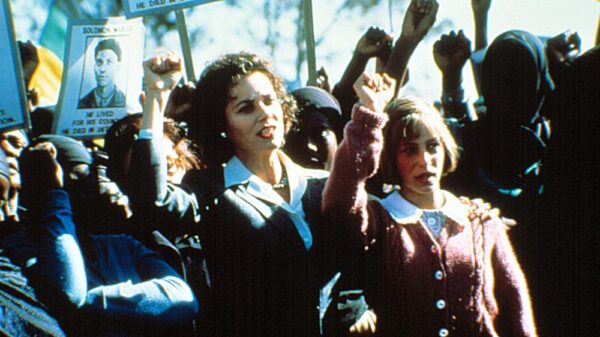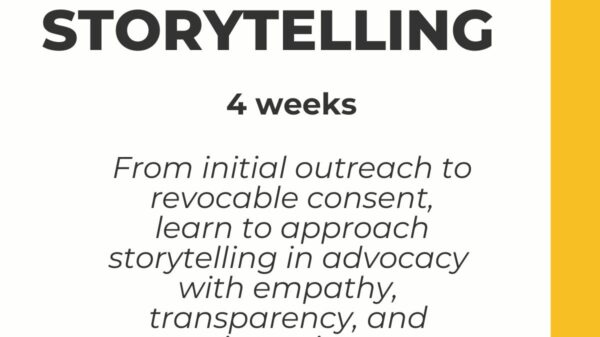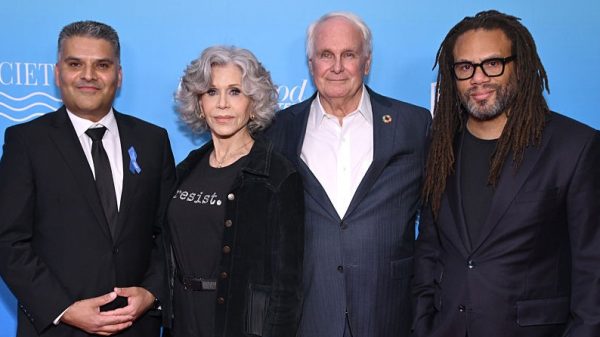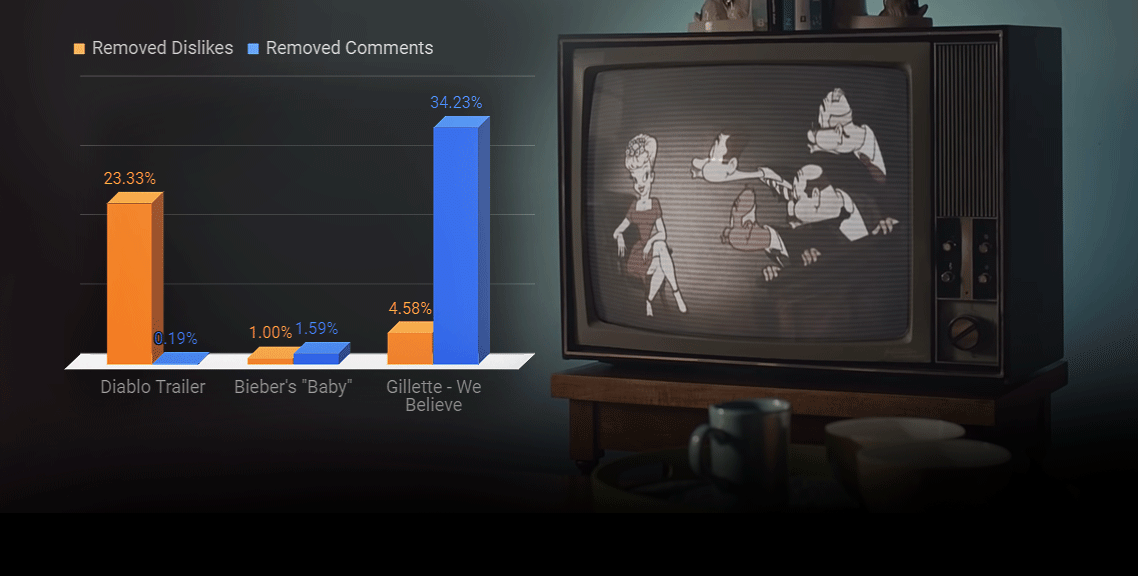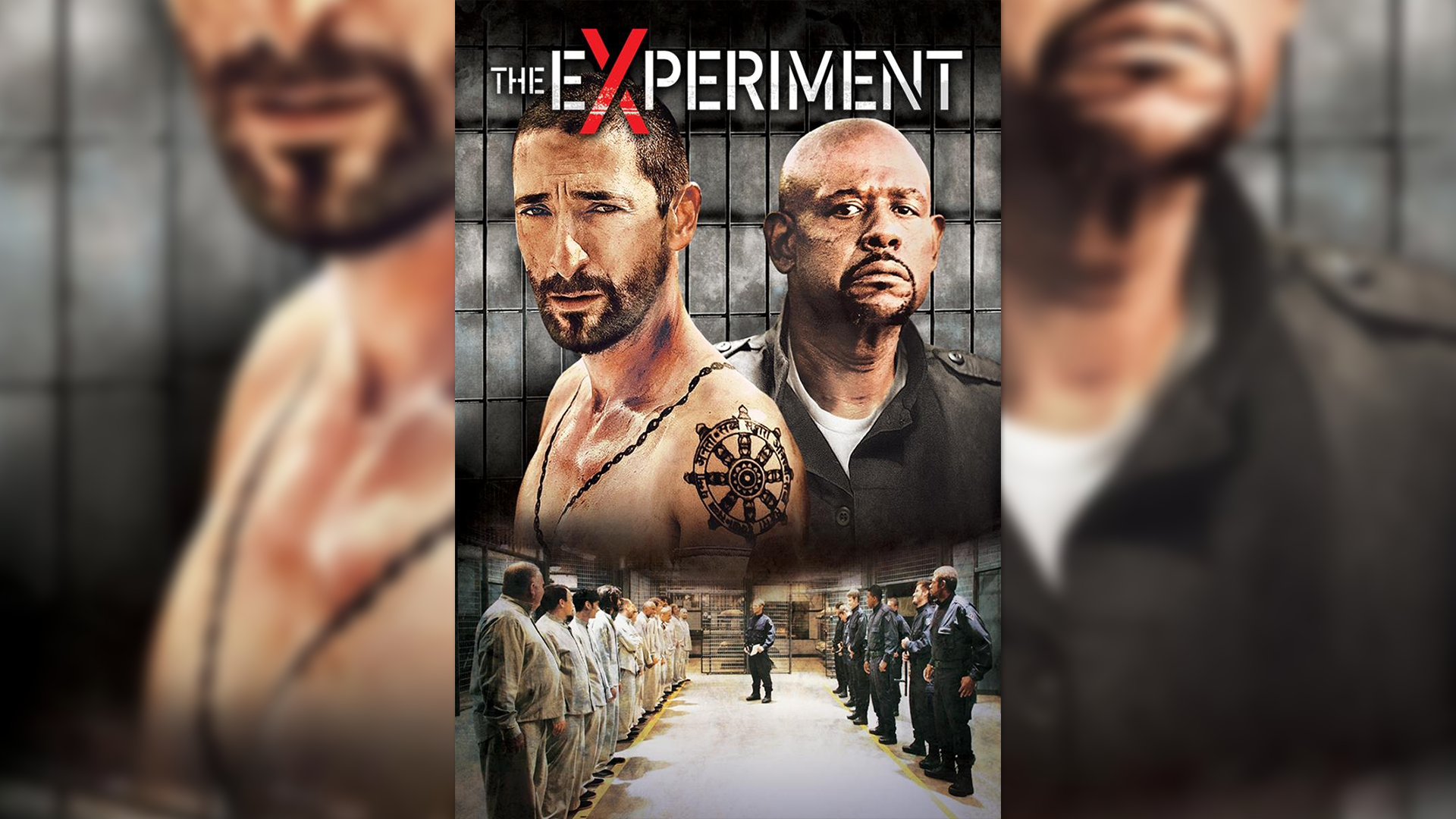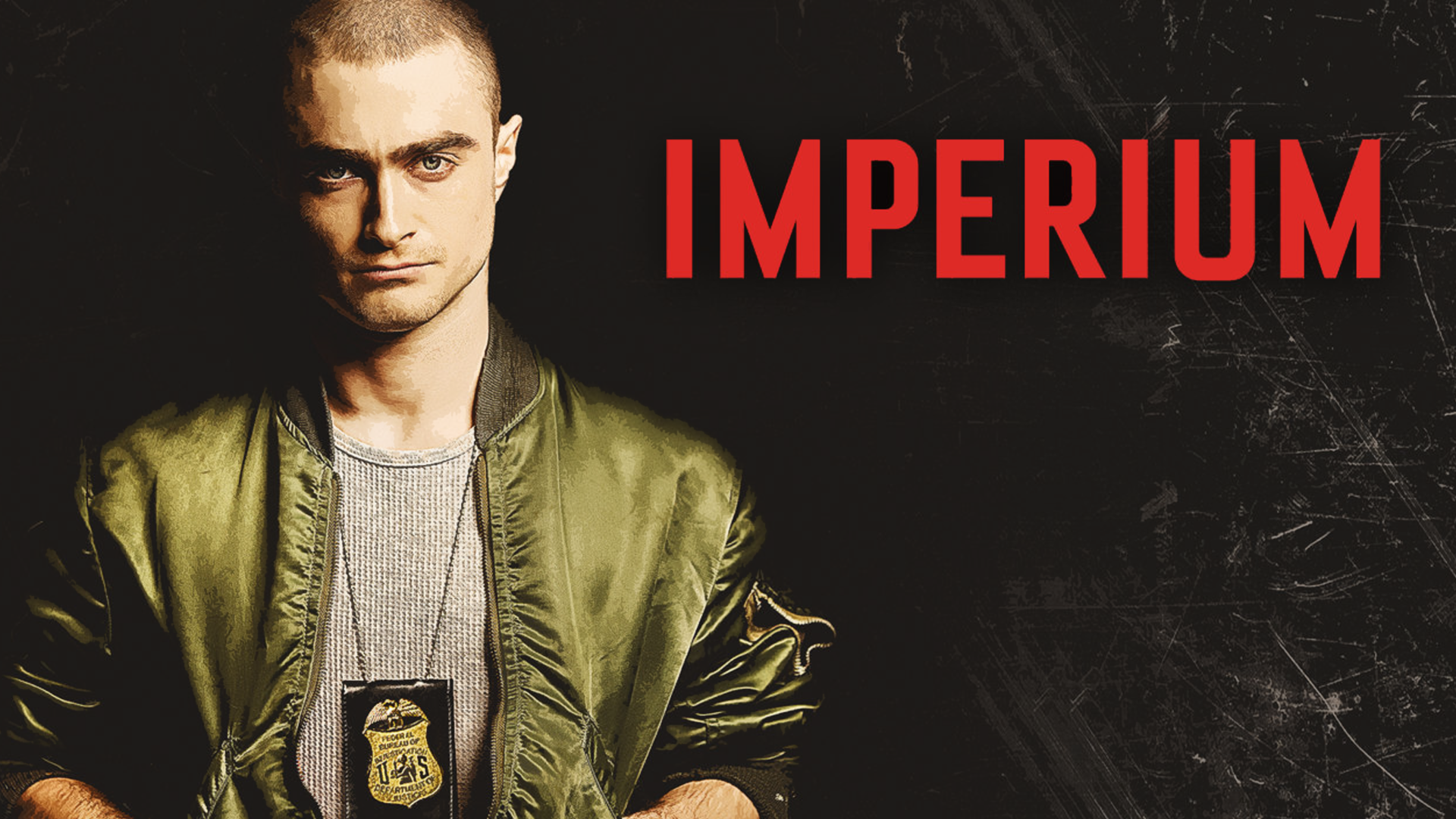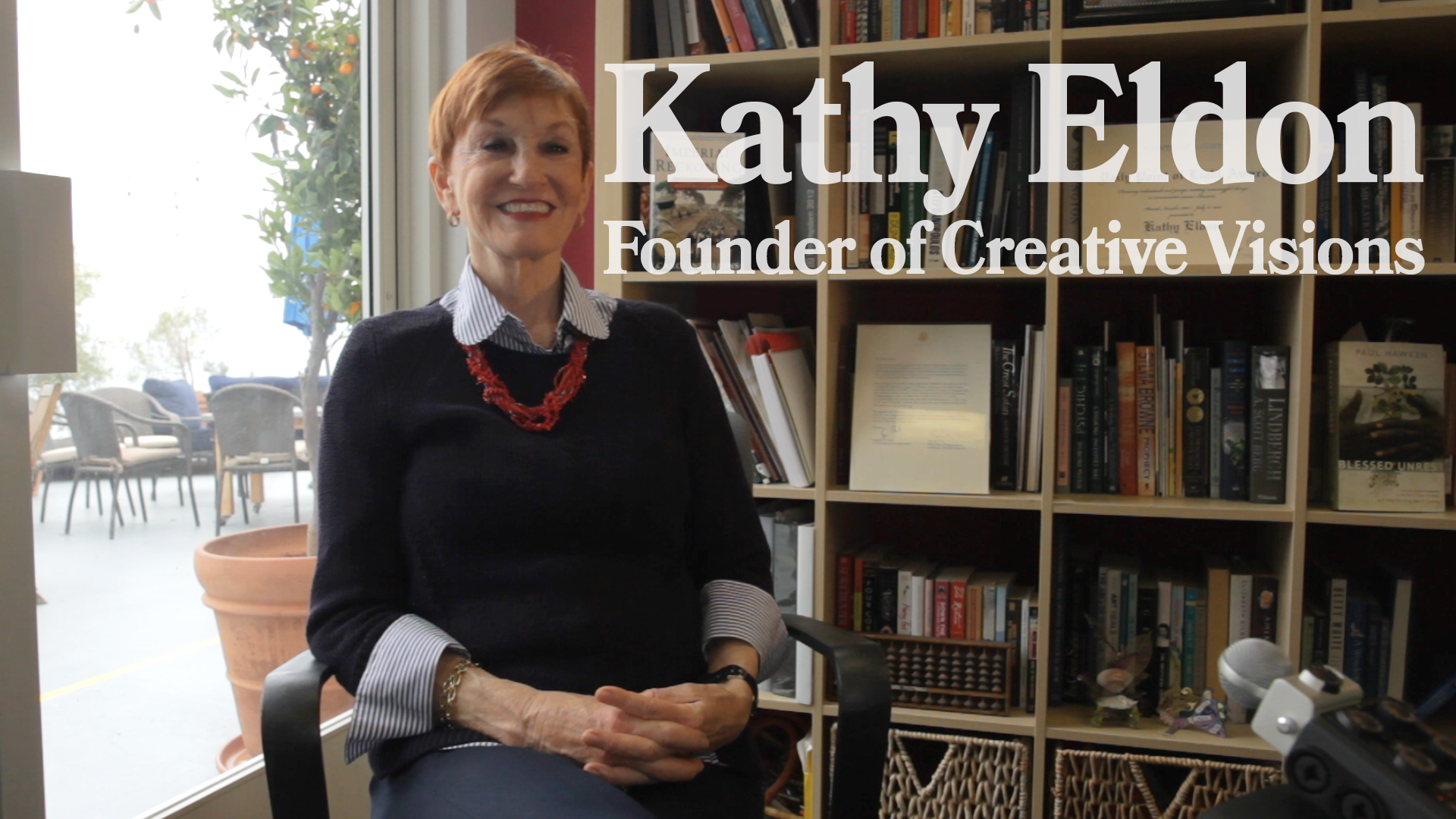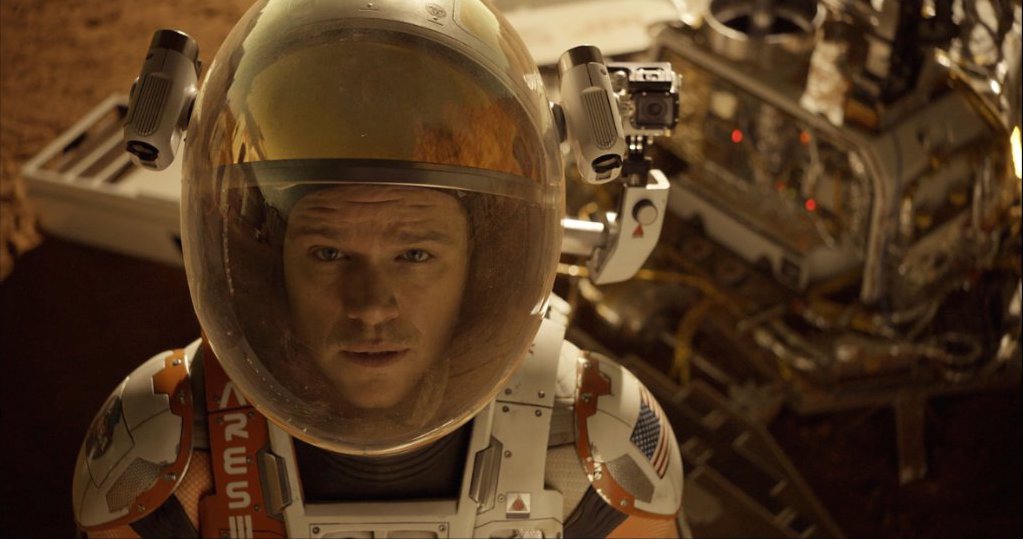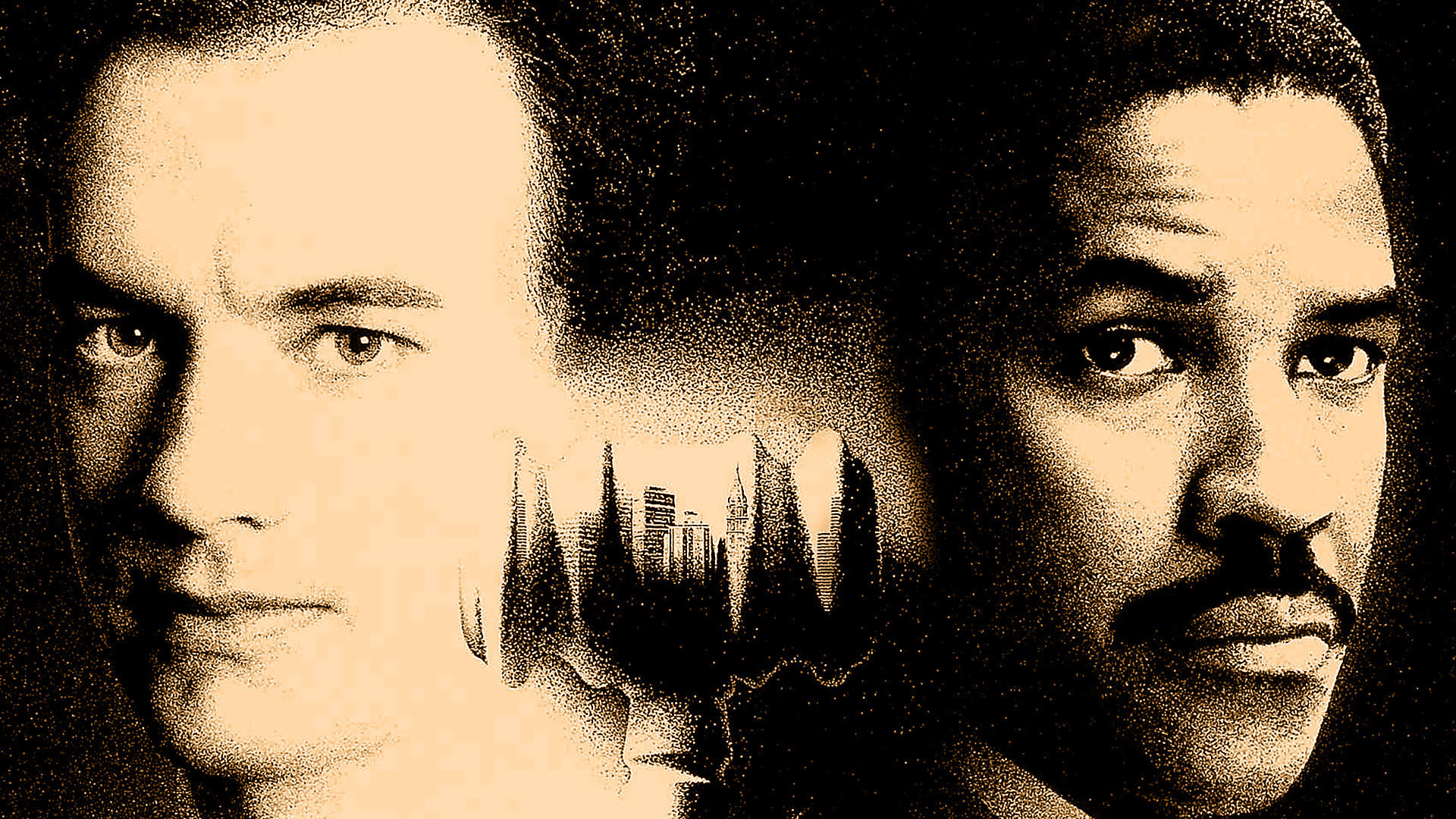What a bracing experience Ridley Scott’s The Martian turned out to be. In an age of films leadened by misplaced self-importance, here is one whose core philosophical quandary is, “Now what?” That might seem a bit simplistic at face value, but from those two words rocket forth a film brimming with excitement, humanity, and, perhaps least expectedly, humor. I’m always at a loss when deciding what to call a film like this. Is it science-fiction? Science-faction? A comedy? Perhaps I should simply call it a thriller, and yet that undersells this wonderful movie so spectacularly that I instead choose to leave such issues of nomenclature to you.
One advantage the movie has is an uncanny, lightning-rod timeliness. Just one week ago, NASA revealed that the existence of flowing water on Mars, long suspected, had finally been confirmed. After a discovery like that, setting a film there almost seems anachronistic, as if this mysterious red planet is no longer the match strip of imagination it once was; by shining light on its enigmas, that faraway world has become part of our backyard. Fortunately for the film, so too have its dangers.
We open on NASA botanist Mark Watney (Matt Damon) performing Martian soil experiments as part of a manned research mission, presumably to explore possibilities of colonization. As his crew mates begin gauging the strength of an oncoming dust storm, they quickly realize its intensity far exceeds their predictions, forcing the crew to abort the mission and prepare for an emergency evacuation. On his way to safety, however, Mark is struck by a tumbling piece of equipment, launching him into the thick of the storm and beyond the help of his crew mates. They wait as long as possible without jeopardizing their own safety before making a critical judgement call: they presume Mark dead and fire into space without him.
Except he isn’t dead. As if from a bad dream, Mark wakes up terrified, half-buried in red dust, skewered through the stomach, and oxygen critically low. After recovering his strength and senses, he stumbles his way back to the mission’s research pod, still in one piece where the crew left it. Here, safe and sound, he begins a video diary to process the reality of his new circumstances: he is thirty-four million miles from safety, completely alone in every direction, and by all accounts, f**ked. Even if his crew knew he was alive, it would be at least four years before any rescue mission could reach him, so he decides that unless he wants to starve to death, he needs to fashion a way to grow sustainable crops on a dead planet, establish communication with NASA, and conjure some convoluted way to, if I may take a line from Saving Private Ryan, “… get him the hell outta there.”
The above is cause enough for pause and panic, but it is just the first in an avalanche of “I’m sorry, come again?” dilemmas and fixes that relentlessly twist and turn, succeed and backfire. These moments reveal themselves as the film’s most unexpected pleasures. Through intelligence and incisive wit, we observe the machine-cut mechanics of a scientist’s mind as he attempts to manufacture his own rescue from the tiniest of resources. Even at their most far-fetched, every solution is rendered plausibly and practically, with an academic attention to detail. As the Martian conjuring it all, Matt Damon commands this material as if he wrote it himself. He brings realism and clarity to Mark Watney, perfectly melding his everyman temperament with his real-life intelligence. When he laughs, we laugh with him, and when he digs deep into terminology and process, we believe every word.
Meanwhile, back on Earth, NASA scrambles to decide the appropriate course of action, and in space, the crew that abandoned Watney cope with the guilt of leaving him behind as they at coordinate with Houston. I’m trying to spoil as little plot as possible, but I will say this: The characters in these scenes could have very easily been written as disposable suit-and-ties, but here, played by veteran actors, all of them are given centerstage to breath and exist as real people. Jessica Chastain, perhaps the finest actor of this decade, plays Melissa Lewis, the commander of the initial mission the left Mark stranded. Instead of creating a hard-case, Chastain plays Melissa as a conflicted woman holding herself together for the sake of her crew even as her conscience crumbles beneath her steel surface. It’s a quiet performance, and perhaps more powerful for it.
Some of the smallest parts turn out to be the ones you remember most on the drive home. I could name a few: Jeff Daniels; Michael Peña; Sean Bean; Mackenzie Davis; but the one that really struck me was Donald Glover. He has a very small role as Rich, a prodigious astrophysicist who looks disheveled but speaks watertight sense. Glover is perhaps more notable for music and television than film, and yet as I watched him, I was almost angry that he had kept his talents off the big screen for so long.
None of it would work without the film’s two most crucial components: a faultlessly constructed screenplay by Drew Goddard (Cabin in the Woods), and precise, no-frills direction from Ridley Scott, perhaps the director’s most focused work in years. Since the turn of the century, he has aimed to simplify his style and increase his output, but in doing so, he has also developed a habit of choosing cumbersome scripts that are out of sync with his newfound efficiency. This has led to a juggling act of successes (Gladiator, Kingdom of Heaven) and failures (Robin Hood, The Counselor, Exodus: Gods and Kings). For the first time since he made Matchstick Men twelve years ago, Scott has found a script as brisk and well-oiled as he is. Based on the best-selling book by Andy Weir, it balances humor and drama so well that they begin to grow out of each other, and Scott drives that balance home with a tone that is both anxious and light-footed. At first, you may find yourself wondering why the characters aren’t taking their situations more seriously given the gravity of their situations. I did too, but then I realized: they are taking things seriously. These are people who cope with the outrageousness of their professions by cracking jokes, and in the film’s key moments, these jabs and quips become tinted windows into the souls of people who are scared and uncertain.
All of this builds to a climax as sensational as any I’ve seen this year. It features arresting visuals and top-tier filmmaking, but what’s most impressive is how little you notice those things. What matters in that moment is Melissa Lewis and Mark Watney. You don’t care about the smoke and mirrors — you genuinely begin to wonder if they’ll make it out alive. That is the mark of a pure movie: instead of asking, “How did they do that?”, you ask, “How is this all gonna turn out?”
I leave you with a story: when I was fifteen, my father took me to Cape Canaveral to watch one of the last launches of the Space Shuttle Endeavor before its retirement. Every detail of that morning feels as real and present as it did then; the skin-numbing temperatures that kept us awake at four in the morning; the murmur of the crowd as the countdown neared zero; the spine-tingling silence that spread over us when the sky ignited red, orange, and yellow as the shuttle rose noiselessly into the sky, a candle-lit tribute rippling down a cosmic lake; and, perhaps most vividly, the immense pride I felt as a member of the same species responsible for such a humbling sight. This was, I’m afraid to say, painfully short-lived. On the drive back to my home in South Carolina, I heard on the radio that the Constellation program, NASA’s years-long initiative to embark on new manned space missions (featuring, oddly enough, spacecrafts named Ares, the same name as the crafts in this film), had been canceled. I’d been defeated almost as soon as I’d been inspired. What a rip-off.
Fear not, however. After seeing The Martian, I felt that pride flowing back to me, the awe of that cold morning settling in after years of absence. To watch scientists overcoming insurmountable odds and accomplishing world-sweeping feats through real science was a privilege I’m not used to finding at the movies. It was a great feeling, and this is a great film.
Spencer Moleda is a freelance writer, script supervisor, and motion picture researcher residing in Los Angeles, California. His experience ranges from reviewing movies to providing creative guidance to fledgling film projects. You can reach him at: spencermoleda@gmail.com


